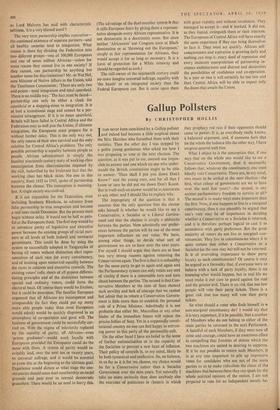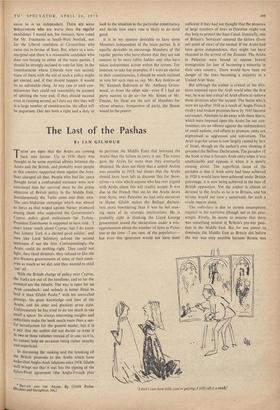Gallup Pollsters
By CHRISTOPHER HOLLIS lliAD never been catechised by a Gallup pollster and indeed had become a little sceptical about the Mrs. Harrises who furnished them with their statistics. Then the other day I was stopped by a polite young gentleman who asked me how I was proposing to vote at the next election. The question, as it was put to me, seemed one impos- sible to answer and one which no one who under- stands the British constitution ought to be able to answer. 'Then shall I put you down Don't Know?' said the young man, and for all that I know or care he did put me down Don't Know. But in truth such an answer would be as inaccurate as any other, and I should like to explain why.
The impropriety of the question is that it assumes that the only question that the elector asks himself is whether he would like to see a Conservative, a Socialist or a Liberal Govern- ment and that the election is simply a plebiscite between the parties. Now admittedly our prefer- ences between the parties will be one of the most important influences on our votes. We have, among other things, to decide what sort of government we are to have over the next years. For myself I should argue that there are at least two very strong reasons against returning the Conservatives again. The first is that it is unhealthy for the same party to get in again and again and the Parliamentary system can only retain any sort of vitality if there is a reasonable turn and turn about between the parties. The second is that Con- servative Members at the time of Suez showed such servility and lack of courage that we cannot but admit that to return a Conservative Govern- ment is little more than to establish the personal rule of a Prime Minister. Admittedly it is not probable that either Mr. Macmillan or any other leader of the immediate future will repeat the precise follies of Suez. Yet in a supposedly consti- tutional country no one can feel happy in entrust- ing power to this party of the personality-cult.
On the other hand I have no belief in the sense of further nationalisation or in the capacity of the Socialists to prevent a new bout of inflation. Their policy of controls is, to my mind, likely to be both tyrannical and ineffective. So, on balance, in so far as it is for me choose, my choice would be for a Conservative rather than a Socialist Government over the next years. Yet naturally I take no more seriously than does anybody else the exercises of politicians in rhetoric in which they prophecy red ruin if their opponents should come to power. It is, as everybody really knows, a balanced argument, and, if someone feels that on the whole the balance tilts the other way, I have no great quarrel with him.
What I object to is the assumption that, if one says that on the whole one would like to see a Conservative Government, then it necessarily follows that, whatever the constituency, one must blindly vote Conservative. There are, to my mind, two issues to be settled at the next election—the first, what colour of government are we to have over the next few years?—the second, is any serious parliamentary freedom to survive at all? The second is in many ways more important than the first. Now, if one happens to live in a marginal constituency, then it can plausibly be argued that one's vote may be of importance in deciding whether a Conservative or a Socialist is returned, and it is therefore perhaps logical to cast it in accordance with party preference. But the great majority of voters do not live in marginal con- stituencies. They live in constituencies where it is quite certain that either a Conservative or a Socialist (as the case may be) will not be returned. Is it of overriding importance to show party loyalty in such constituencies? Of course it may be argued as a formality that, if everyone were to behave with a lack of party loyalty, there is no knowing what would happen, but in real life we must make it our care to guard against the real and the greater evil. There is no risk that too few people will vote their party tickets. There is a great risk that too many will vote their party tickets.
So what should a voter who finds himself in a non-marginal constituency do? I would say that it is very important, if it be possible, that a number of Members who do not belong to either of the main parties be returned to the next Parliament. A handful of such Members, if they were men of sense and courage, could have an enormous effect in compelling that freedom of debate which the two machines are united in desiring to suppress. If it be not possible to return such Members, it is at any rate important to pile up impressive votes for candidates who are not of the main parties so as to make ridiculous the claim of the machines that between them they can speak for the whole political opinion of the nation. I am not prepared to vote for an independent merely be- cause he is an independent. There are some independents who are worse than the regular • candidates. I would not, for instance, have voted for Mr. Fountaine in South-West Norfolk, nor for the Liberal candidate at Carmarthen who came out in favour of Suez, But, where in a non- marginal seat there is a reasonable candidate who does not belong to either of the main parties, I should be strongly inclined to vote for him. In the constituencies where Liberals now run second, some of them with the aid of such a policy might get elected, and, if that should happen, it would be an admirable thing. At any rate in such con- stituencies they could not reasonably be accused of splitting the vote and, if they should succeed even in running second, as I dare say that they will in a large number of constituencies, the effect will be important. One has both a right and a duty to look to the situation in the particular constituency and decide how one's vote is likely to do most good.
It is in my opinion desirable to have some Members independent of the main parties. It is equally desirable to encourage Members of the regular parties who have shown that they are not content to be mere lobby fodder and who have taken independent action within the system. For instance, to take but examples, if 1 were an elector in their constituencies, I should be much inclined to vote for such men as, say, Mr. Roy Jenkins or Mr. Kenneth Robinson or Mr. Anthony Green- wood, or from the other side—even if I had no party suasion to do so—for Mr. Simon or Mr. Deedes, for these are the sort of Members for whose absence, irrespective of party, the House would be the poorer.















































 Previous page
Previous page